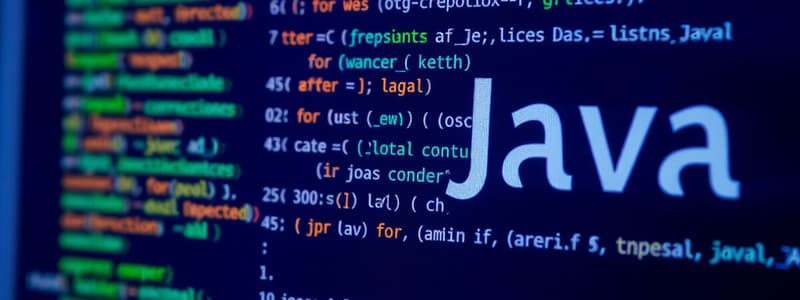Podcast
Questions and Answers
What is the purpose of data types in Java programming?
What is the purpose of data types in Java programming?
- To manage memory allocation
- To categorize different programming languages
- To create variables in programming
- To define a set of related data values (correct)
Which of the following correctly defines integer division in Java?
Which of the following correctly defines integer division in Java?
- Using % to find the quotient
- Using / to find the quotient discarding remainder (correct)
- Using // to perform floor division
- Using / to find the decimal value
What is string concatenation in Java?
What is string concatenation in Java?
- Changing the case of a string
- The process of dividing strings into substrings
- Comparing two strings for equality
- Combining two or more strings into one (correct)
What does it mean to declare a variable in Java?
What does it mean to declare a variable in Java?
What might result in a compile error in Java?
What might result in a compile error in Java?
Flashcards are hidden until you start studying
Study Notes
Introduction to Data Types
- Data types categorize related sets of values, such as integer (int) for whole numbers.
- Examples of data types include integer, real number, and string.
Java Data Types
- Java has specific data types like int for integers and double or float for real numbers.
Expressions
- Expressions are combinations of variables, constants, and operators to produce a value.
Arithmetic Operators
- Common arithmetic operators include:
/for division%for modulus (remainder)
Integer Division
- The
/operator when applied to integers performs integer division, discarding the fractional part.
Integer Remainder
- The
%operator returns the remainder of the division of two integers.
Operator Precedence
- Operator precedence determines the order of operations in expressions.
- Higher precedence operators are evaluated before lower precedence ones.
Examples of Precedence
- Parentheses increase precedence, ensuring enclosed expressions are calculated first.
Real Numbers
- Java supports real numbers through
floatanddoubletypes, withdoublehaving greater precision.
Mixing Data Types
- Mixing data types in expressions can lead to implicit type conversion, which may result in loss of data.
String Concatenation
- The
+operator can be used to concatenate strings, joining them together.
Variables Overview
- Variables are named storage locations in memory used to hold data values.
- Examples of variables can include different data types such as int, double, and String.
Declaration of Variables
- A variable must be declared with a specified data type before it can be used.
Assignment of Variables
- Assignment assigns a value to a variable using the
=operator.
Declaration and Initialization
- Variables can be both declared and initialized (assigned a value) in one statement.
Using Variables
- Variables can be used in expressions and calculations, enhancing code functionality.
Assignment and Algebra
- Mathematical expressions can involve variables, allowing for algebraic manipulation.
Assignment and Types
- Type matching is important; assigning a value to a variable must correspond to its declared data type.
Compile Errors
- Errors may occur during compilation due to incorrect data types or improper variable usage.
Printing Variable Values
- Values stored in variables can be displayed using print statements, aiding in debugging and output.
Studying That Suits You
Use AI to generate personalized quizzes and flashcards to suit your learning preferences.



